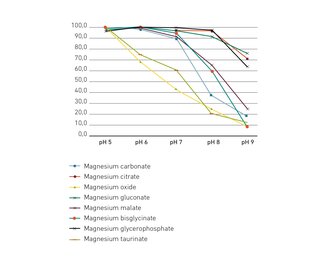Magnesium may be a lightweight among metals, but it is a real heavyweight when it comes to health. Whether it's the nervous system, energy metabolism, muscle function, immune system or blood circulation – magnesium is involved in over 300 bodily functions. In short, without magnesium, nothing would work in our bodies. This makes it all the more important to always have a good supply of this essential trace element. But how much magnesium does our body really need and which foods are rich in it? In this article, we take a deep dive into the world of magnesium, highlighting its effects, daily requirements, and various forms and compounds that are available as dietary supplements. Find out how you can get the most out of this mineral!
What is magnesium?
Magnesium is a vital mineral for us humans, without which many things in our body would not work. Therefore, it must be supplied in sufficient quantities through our diet.
The effect of magnesium: what does it do in the body?
A closer look at magnesium reveals the light metal to be a true all-rounder with a wide range of benefits. Its most important tasks in the body include the following areas:
Magnesium: an important building block for strong bones and teeth
The human body contains around 20-30 g of magnesium. Most of it is found in our bones (around 60%) – and not without reason! After all, magnesium helps to stabilise the bone as well as its growth and mineralisation. While a good supply of magnesium is an important factor for hard and stable bones, studies show that, just like calcium deficiency, it can increase the bone disease osteoporosis and increase the frequency of fractures. Among the many benefits of magnesium, its role in supporting bone strength and resilience is especially noteworthy.
Cell protection and cell division: magnesium is essential at the cellular level
What strengthens our bones is also essential for our cells. In terms of quantity, magnesium is the second most important mineral in the cells and regulates their stability and permeability. Cell permeability is an important health factor because it ensures that vital substances can be smoothly introduced into the cell and unnecessary metabolic products can be well discharged from the cell. Magnesium is an activator of many enzymes and plays an important role in cell division. It also plays a role in the production of nucleic acids. The best-known nucleic acid is the spiral-shaped DNA that carries our genetic information. Other nucleic acids are responsible for the production of proteins and enzymes. These cellular-level benefits of magnesium make it an indispensable element for internal balance and regeneration.
Muscles and nerves: magnesium as the key to relaxation
Tensing... relaxing... – an impossibility without magnesium. This light metal not only ensures that our muscles contract and relax, it is also essential for the smooth transmission of nerve impulses. If, on the other hand, there is a magnesium deficiency, the proper communication between muscles and nerves can be disrupted and painful calf cramps can occur. In this case, targeted magnesium supplementation can get to the root of the problem. Magnesium also helps us relax and feel good on a psychological level. It plays a role in the production of the happiness hormone serotonin.
The effect of magnesium as an energy booster: more power for body and mind
Whoever says energy must also say magnesium. After all, this power substance is indispensable for all bodily functions related to the production, storage and consumption of energy. While a good magnesium supply keeps our energy levels in check, a deficiency can lead to physical and mental decline. Studies repeatedly show that a good magnesium supply is a ‘must-have’, especially for athletes. A recent review shows that athletes who take magnesium supplements benefit from improved performance and regeneration, while muscle soreness after training is reduced. In short, the energy-related benefits of magnesium are far-reaching – from daily vitality to athletic performance.
Hormone balance: magnesium is an all-rounder when it comes to hormone balance
Our hormonal balance is a highly complex control system in which tiny messenger substances (= hormones) are in charge. What many people do not know is that magnesium is incredibly important for the sensitive hormonal balance. It doesn't matter whether it's our sex or stress hormones, the regulation of our blood sugar level or the thyroid gland – magnesium is involved at the hormonal level in many ways, playing a key role in hormone formation (e.g. progesterone, oestrogen, testosterone).
Cardiovascular system: magnesium is an important heart protector
A good magnesium supply should be close to our hearts in the truest sense of the word. This is because the mineral plays a vital role in maintaining the health of our cardiovascular system. For example, magnesium supports blood sugar and insulin metabolism, as well as muscle function and the energy balance of the heart. In addition, magnesium has a beneficial effect on blood pressure – both as a preventive measure and for existing high blood pressure.
Daily requirement: how much magnesium do you need each day?
| Population group | Reference values for daily magnesium intake |
| Adult men | about 400 - 420 mg |
| Adult women | about 310 - 320 mg |
| Breastfeeding women | about 310 - 320 mg |
| Pregnant women | about 350 - 360 mg* |
| Male 14- to 18-year-olds | about 410 mg |
| Female 14- to 18- year-olds | about 360 mg |
| Children | between 80 and 240 mg depending on age |
Table 1: Magnesium daily requirement (source: National Institutes of Health, 2024)
*New scientific studies suggest that expectant mums need more – approx. 360 to 400 mg of magnesium daily.
The general magnesium recommendations are around 400-420 mg for men and 310-320 mg for women per day. However, those who regularly push themselves to the limit in sports or in their daily lives probably need more to ensure that all magnesium-dependent bodily functions – especially muscle and stress defense – function optimally.
Magnesium requirement depends on the situation
Young people and people aged 50 and over are particularly prone to magnesium deficiency. At these stages of life, it is especially important to meet the daily requirement with a balanced diet and the intake of supplements. Children and seniors who eat little should include foods with a particularly high magnesium content in their diet.
Even everyday life situations have a direct influence on magnesium requirements. A strong ‘magnesium thirst’ is caused, among other things, by:
- Stress, nervous tension, worries
- Physical exertion
- Sports
- Unbalanced nutrition, diets
- Pregnancy and breastfeeding
- Growth of children and adolescents
- Taking diuretics
- Excessive alcohol consumption
In these situations, it makes sense to increase your magnesium intake as a precaution, because once a magnesium deficiency has taken hold, replenishing the empty stores often proves difficult and takes a long time. The most promising strategy in the event of a deficiency is to take a suitable magnesium supplement regularly and eat a balanced diet for several months.
You can recognise magnesium deficiency by these symptoms
The effects of an insufficient supply of magnesium are clearly noticeable in many cases, but are often not directly associated with a possible magnesium deficiency. But how does magnesium deficiency manifest itself in many cases? These are typical signs:
- Cramps in muscles, thighs, calves or toes
- Twitching in the facial muscles or eyelids
- Tension in the shoulder, neck or back areas
- Increased sensitivity to stress
- Reduced sleep quality
- General restlessness and nervousness
Magnesium in food
Magnesium is found in numerous animal and plant-based foods, although the content can vary greatly in some cases. Good sources of magnesium include wholemeal products, green leafy vegetables, legumes, nuts and seeds, as well as fish and seafood. Despite their low magnesium content, meat, potatoes and bananas also contribute to the magnesium supply in the population due to the amount and frequency with which they are consumed.
| Food | Magnesium (mg/100 g) |
| High content: > 200 mg/100 g | |
| Cashews | 270 |
| Almonds | 220 |
| Medium content: 35 - 200 mg/100 g | |
| Dark chocolate | 149 |
| Wholemeal wheat flour (type 1 700) | 140 |
| Walnuts | 130 |
| Leaf spinach (cooked) | 43 |
| Edam (45 % fat in dry matter) | 37 |
| Bananas | 36 |
| Low content: < 35 mg/100 g | |
| Plaice (cooked) | 24 |
| Oranges | 14 |
| Wheat flour (type 550) | 10 |
Table 2: Magnesium content of selected foods (adapted from Leitzmann C. et al, 2009)
Although magnesium is found in many foods, our modern fast-paced lifestyle makes it challenging for many people to get the daily requirement from their diet alone. In particular, during phases of increased demand or in the case of an existing deficiency, the additional intake of a suitable magnesium supplement can be recommended.
Magnesium intake & dosage
Magnesium supplements are considered the perfect answer to an increased magnesium requirement and the most promising strategy for remedying an existing deficiency. In this context, adequate dosing and correct intake are crucial to success.
Magnesium as a dietary supplement
Magnesium tablets, capsules, powder, drops. If you go online and search for magnesium supplements, you will be met with an incredible variety of different products. The best tolerability is achieved by products that are manufactured according to the pure substance principle – mostly capsule products. Only these guarantee that the magnesium preparation contains no unnecessary additives or excipients, whereas magnesium tablets contain additives to help them retain their shape. The bioavailability (= absorption capacity) of the mineral also benefits from this ‘less is more’ principle, because additives can hinder the absorption of magnesium.
Not all magnesium is the same: what magnesium compounds are there and what makes them different?
Not all magnesium supplements are the same: there are various magnesium compounds, which differ mainly in their absorption in the body and their actual magnesium content. For someone who wants to learn about magnesium, it is important to know which forms there are and which ones work best. Depending on their chemical composition, magnesium compounds can be categorised into organic and inorganic magnesium salts.
Important organic magnesium compounds include:
- Magnesium citrate
- Magnesium malate
- Magnesium gluconate
- Magnesium glycerophosphate
- Magnesium bisglycinate
Important inorganic magnesium compounds are:
- Magnesium oxide
- Magnesium carbonate
- Magnesium chloride
We often hear or read that organic magnesium compounds are better than inorganic forms. This claim can be traced back to the better usability of organic magnesium compounds. But should organic minerals generally be given priority and inorganic minerals ideally avoided? To shed light on this question, some background knowledge is essential.
Solubility & content: How the individual magnesium compounds differ from one another.
When it comes to selecting a suitable magnesium compound, two fundamental aspects play a role: on the one hand, the solubility (= usability) of the compound and, on the other, its magnesium content.
Solubility
The solubility of a magnesium compound determines how well it can be utilised. This is because our intestines can only absorb magnesium when it has been released from its bond – ideally already in the stomach. If, on the other hand, magnesium remains bound to its binding partner, it moves on into the large intestine and is ultimately excreted unused. Thanks to various series of experiments, we now know more about the different solubility behaviours of various magnesium compounds (Fig. 1). While organic magnesium compounds generally dissolve more easily – even in a less acidic environment – inorganic magnesium salts require a significantly more acidic pH value to ‘break up’ the bond, as is only found in a healthy natural gastric environment.

Further explanation of the figure:
Our digestive tract – from the stomach to the large intestine – is characterised by different pH values. The higher (= more alkaline) the pH value, the lower the solubility of the magnesium compound and thus its availability.
- At an acidic pH of 5, all salts exhibit the highest solubility behaviour.
- At a pH of 6–7, clear differences between the salts are noticeable.
- At pH values of 8–9, only the citrate, gluconate and glycerophosphate compounds are relatively soluble.
A series of investigations by the BIOGENA science team in cooperation with GANZIMMUN
Magnesium content
However, it would be short-sighted to demonise inorganic magnesium forms due to their poorer solubility. These compounds also have their advantages. For example, inorganic magnesium compounds have a significantly higher magnesium content than organic forms (Tab. 3). In a confined space, such as a capsule, more magnesium can be provided by using inorganic compounds.
|
Magnesium compound |
Magnesium content |
|
Approx. 15% elemental magnesium |
|
|
Magnesium malate |
Approx. 15% elemental magnesium |
|
Magnesium gluconate |
Approx. 5% elemental magnesium |
|
Magnesium glycerophosphate |
Approx. 12% elemental magnesium |
|
Magnesium glycinate |
Approx. 12% elemental magnesium |
|
Magnesium oxide |
Approx. 63% elemental magnesium |
|
Magnesium carbonate |
Approx. 32% elemental magnesium |
Table. 3: The magnesium content of different magnesium compounds
Which type of magnesium is best?
There is no general answer to the question of which magnesium is ‘the best’. Rather, the ‘perfect magnesium’ depends on the individual needs of each person. For example, the particularly well-tolerated magnesium bisglycinate is ideal for people with sensitive digestion, while magnesium citrate provides a good supply of magnesium even with low stomach acid. For athletes, on the other hand, it can be beneficial to take magnesium together with its physiological partner potassium.
Conclusion
Magnesium is essential for maintaining general health and well-being. Since the body cannot produce magnesium itself, an external supply is of great importance to compensate for any deficiencies that arise. Especially in situations with high physical and mental demands, during stress, pregnancy or illness, it is usually not possible to get all the magnesium you need from food – in these cases, it is recommended to take additional high-quality magnesium supplements.
If you are looking for a different product – discover the diversity of our range:
Frequently asked questions
Magnesium is a versatile mineral that is involved in over 600 bodily reactions. This all-rounder contributes to smooth nerve and muscle function and a vital energy metabolism. In addition, magnesium is also incredibly important for our hormone balance, for stable bones and for maintaining a healthy cardiovascular system. And you can even rely on magnesium on a mental level, because the light metal ensures more relaxation, a good mood and a perceived reduction in stress.
A good magnesium supply is also of great mental value. The mineral contributes to normal nerve function and influences the psyche by regulating certain neurotransmitters. Studies show that magnesium has a calming and stabilising effect on the central nervous system and increases resistance to stress. In contrast, a magnesium deficiency can be associated with fatigue, restlessness, mood swings and sleep disorders.
According to the recommendations of the NIH (National Institutes of Health), men should take in about 400–420 mg of magnesium daily and women about 310–320 mg. Under certain circumstances and in certain life situations, such as during stress, regular exercise or pregnancy, the magnesium requirement increases even further.
Not all magnesium products are the same. The mineral is available on the market in different qualities. Since dietary supplements are usually taken over a longer period of time, it is important to choose high-quality products that have been manufactured according to the pure substance principle. This ensures optimal absorption of the magnesium contained in the product and guarantees the best possible tolerability.
Further reading:
(1) Schmidbauer, C., Hofstätter, G. et al. 2022. Biogena Mikronährstoffcoach. 4. Auflage.
(2) ELDerawi W.A. et al. 2018. The Effects of Oral Magnesium Supplementation on Glycemic Response among Type 2 Diabetes Patients. Nutrients. 2018 Dec 26;11(1):44.
(3) Veronese, N. et al. 2020. Magnesium and health outcomes: an umbrella review of systematic reviews and meta-analyses of observational and intervention studies. Eur J Nutr. 2020 Feb;59(1):263-272.
(4) Volpe, S. L. 2013. Magnesium in disease prevention and overall health. Adv. Nutr. 4(3):378S–83S.
(5) Rylander, R. 2014. Bioavailability of Magnesium Salts – A Review. J Pharm Nutr Sci. 4:57–9.
(6) Witkowski, M. et al. 2011. Methods of assessment of magnesium status in humans: a systematic review. Magnes Res. 24(4):163–80.
(7) Maggio, M. et al. 2014. The Interplay between Magnesium and Testosterone in Modulating Physical Function in Men. Int J Endocrinol. 2014:525249.
(8) Kupetsky-Rincon, E. A., Uitto, J. 2012. Magnesium: novel applications in cardiovascular disease – a review of the literature. Ann Nutr Metab.
(9) 61(2):102–10.
(10)Moslehi, N. et al. 2013. Does magnesium supplementation improve body composition and muscle strength in middle-aged overweight women? A doubleblind, placebo-controlled, randomized clinical trial. Biol Trace Elem Res. 153(1–3):111–8.
(11)Veronese, N. et al. 2014. Effect of oral magnesium supplementation on physical performance in healthy elderly women involved in a weekly exercise program: a randomized controlled trial. Am J Clin Nutr. 100(3):974–81.
(12)Santos, D. A. et al. 2011. Magnesium intake is associated with strength performance in elite basketball, handball and volleyball players. Magnes Res. 24(4):215–9.
(13)Serefko, A. et al. 2013. Magnesium in depression. Pharmacol Rep. 65(3):547–54. (10) Eby III, G. A. et al. 2011. Kapitel 23: Magnesium and major depression. In: Magnesium in the Central Nervous System. University of Adelaide Press, South Australia. S. 313-330.
(14)Yary, T. et al. 2013. Dietary intake of magnesium may modulate depression. Biol Trace Elem Res. 151(3):324–9.
(15)Kass, L. et al. 2012. Effect of magnesium supplementation on blood pressure: a meta-analysis. Eur J Clin Nutr. 66(4):411–8.
(16)Švagždienė, M. et al. 2015. Correlation of magnesium deficiency with C-reactive protein in elective cardiac surgery with cardiopulmonary bypass for ischemic heart disease. Medicina (Kaunas). 51(2):100–6.
(17)Fang, X. et al. 2016. Dose-response relationship between dietary magnesium intake and cardiovascular mortality: A systematic review and dose-based metaregression analysis of prospective studies. J Trace Elem Med Biol. 38:64–73.
(18)Sarrafzadegan, N. et al. 2016. Magnesium status and the metabolic syndrome: A systematic review and meta-analysis. Nutrition. 32(4):409–17.
(19)Rodríguez-Moran, M., Guerrero-Romero, F. 2014. Oral magnesium supplementation improves the metabolic profile of metabolically obese, normalweight individuals: a randomized double-blind, placebo-controlled trial. Arch Med Res. 45(5):388–93.
(20)Chiu, H. Y. et al. 2016. Effects of Intravenous and Oral Magnesium on Reducing Migraine: A Meta-analysis of Randomized Controlled Trials. Pain Physician. 19(1):E97–112.
(21)Samaie, A. et al. 2012. Blood Magnesium levels in migraineurs within and between the headache attacks: a case control study. Pan Afr Med J. 11:46.
(22)Ahmad, A. A. et al. 2015. Assessment of serum magnesium level in patients with bronchial asthma. Egypt J Chest Dis Tuberc. 64(3):535–9.
(23)Rylander, R. 2014. Magnesium in pregnancy blood pressure and pre-eclampsia – A review. Pregnancy Hypertens. 4(2):146–9.
(24)De Sousa Rocha, V. et al. 2015. Association between magnesium status, oxidative stress and inflammation in preeclampsia: A case-control study. Clin Nutr. 34(6):1166–71.
(25)Wienecke E., Nolden C.: Langzeit-HRV-Analyse zeigt Stressreduktion durch Magnesiumzufuhr. In: MMW – Fortschritte der Medizin, Volume 156, 2016; S. 12-16.
(26)Deutsche Gesellschaft für Ernährung e.V.: https://www.dge.de/wissenschaft/referenzwerte/magnesium/, Accèso:
(27) National Institutes of Health. 2024: https://ods.od.nih.gov/factsheets/Magnesium-HealthProfessional/, Zugriff: 2.10.2024.
(28) Zhang, X. et al. 2016. Effects of Magnesium Supplementation on Blood Pressure: A Meta-Analysis of Randomized Double-Blind Placebo-Controlled Trials. Hypertension. 68(2):324–33.
(29) Classen H.-G., Kisters K., Gröber U. 2022. Magnesium und Osteoporose. Zeitschrift für Orthomolekulare Medizin 2022; 20(02): 29-32.
(30) Tarsitano M.-G. et.al. 2024. Effects of magnesium supplementation on muscle soreness in different type of physical activities: a systematic review. J Transl Med. 2024 Jul 5;22(1):629. doi: 10.1186/s12967-024-05434-x.









